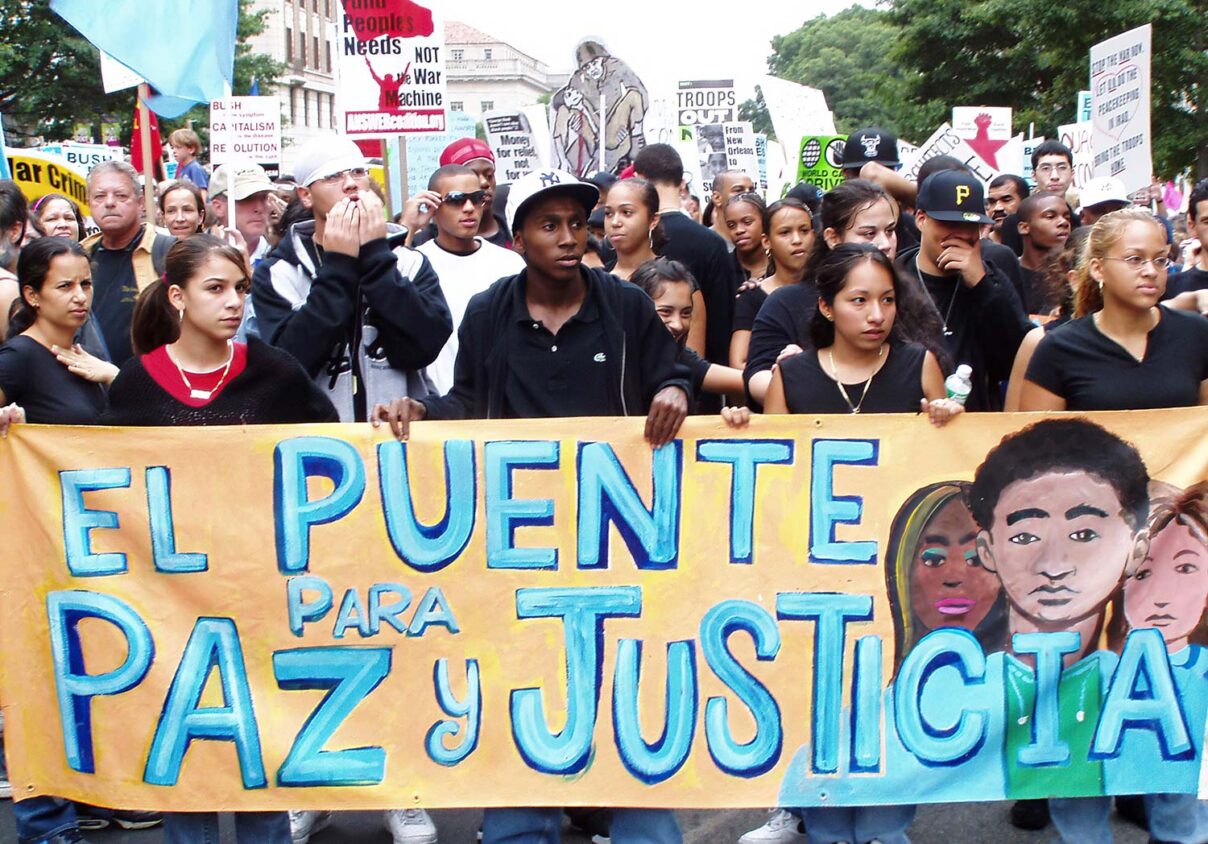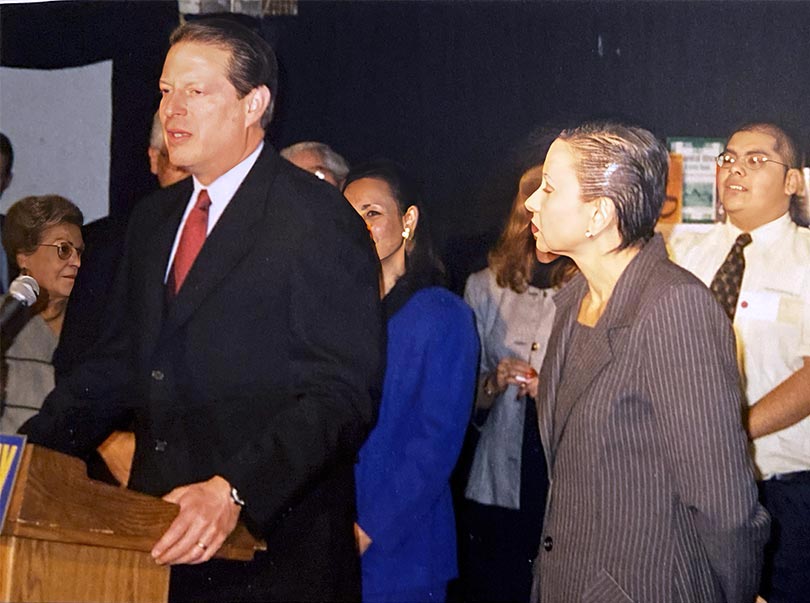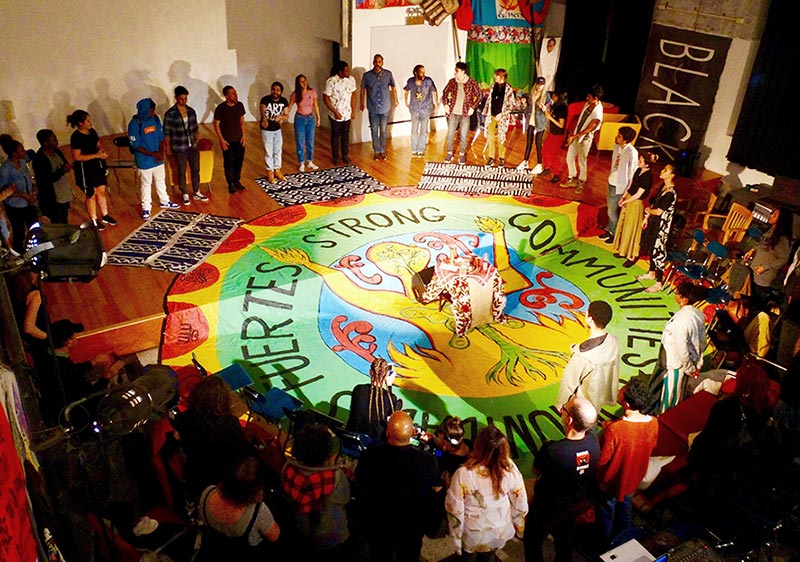The Conversations Have to Happen: Moving From Innovation to Impact

I remember the day I walked into school to find the seniors lining the hallways and blocking the doors with a list of demands. We were stunned. It’s true that we had trained them to do this, but they weren’t supposed to use that training on us! This was a crisis and how we responded would say so much about our beliefs, our relationships, and – frankly – the viability of our model.
Ironically, these were tactics they learned in my U.S. Government class at El Puente Academy for Peace and Justice. We were the first public school committed to human rights in the country. A key component to our model was studying community organizing and how policies are established. We interviewed civil rights leaders and studied how groups organize to create pressure on decision makers.The students took action. They analyzed local bank lending practices and submitted the findings to Congresswoman Nydia Velázquez. They testified before the New York City Council on the impact of waste transfer stations. After they mobilized a relief effort for victims of a hurricane in Central America, then Vice President Al Gore and Congresswoman Velázquez visited to honor their work. Now the seniors were organizing for change in their own school.

The senior protest was an inflection point for El Puente Academy as we understood differently some design tensions in our model and worked to find a productive solution. It kept coming to my mind as I participated in the web-conference Out of the Box, a report from Transcend and New Classrooms that makes a powerful case for developing and spreading the transformative models found on Transcend’s Innovative Models Exchange. How do we implement those models well and incorporate user-centered design work? What happens when there are disagreements – about the model, the strategy, the people? How do those disagreements get resolved in productive ways that ensure impact?
These questions are at the heart of our challenges in innovation. To answer them, we need to understand three key dynamics: power, human development, and knowledge.

Every model engages — intentionally or not — with the historical realities of power. The industrial paradigm, so well summarized by Out of the Box, functions at what Dr. Kimberlé Crenshaw termed intersectionality: of race, class, gender, ableism, oppression and opportunity. We see this in education policy from school goals to funding, curriculum to design, parent engagement to student support. If we are going to talk about transformative models, we need to talk about the way power frames our understanding of the problems and the solutions. The seniors’ protest at El Puente Academy surfaced shifts we needed to make in curriculum and pedagogy to deepen student understanding of organizing. It also challenged us to rethink the role of student voice and choice in our model. It was an important developmental moment as we considered how to fully live into the vision of our school: inspiring and nurturing leaders for peace and justice. Power does not have to divide, but it will as long as we are silent about its implications. As individuals and in our communities, we each have a complicated, multi-faceted relationship to power. Innovations will flourish or fail depending on how well we attend to these complexities.
We must also think deeply about the human beings involved: “Change means different things to different people; in fact, it usually means something different to each and every individual” (Evans, The Human Side of School Change, p. 21). We bring ourselves to work with all our identities, histories, strengths and weaknesses; the science of human development teaches us that:
- We grow and change our minds.
- We care about our own ability to innovate and make choices.
- We do our jobs the best we can each day with incomplete knowledge and information.
- We bring our personal stories and responses to the perspectives we offer and the decisions we make.
We cannot and would not want to remove our humanity from the innovation process. It is essential to making impactful innovations that stick. We also don’t want our models to be built on human idiosyncrasies particular to a place or time. Finding a way to integrate our humanity into the systems and structure of a model is essential to effective implementation.
Finally, our knowledge of effective practice is complicated by two issues. First, knowledge is incomplete. There is cutting edge research today that will shift our understanding of our models tomorrow, whether through formal empirical research or participant led action research. Second, integrating knowledge into practice is hard. Each new curriculum, model, idea, or policy only works if people embrace it, learn it and make it their own. When innovations skip over these realities, we often approach model implementation as technical solutions that flounder in the profoundly adaptive environment of human learning.

I believe we can be explicit about power, embrace our humanity, and move forward grounded in science. Through effective collaboration, we can generate solutions that are about impactful practice, not tolerable compromise. We need both high quality empirical research and user-centered innovation that democratizes the locus of control. We need systematic processes for organizational and personal learning that challenge us to be radically honest and deeply disciplined, focused on managing the tensions between fidelity, adoption and adaptation. As I was writing this piece, I had the opportunity to talk with Michele Jolin, the CEO and Co-Founder of Results for America. In the course of the conversation, she and I generated the term “bold humility”, balancing what we think, know and what we need to learn – and working through the messes along the way. Transforming our schools is possible. The best of our breakthrough models demonstrate that potential. To do so, we must exhibit bold humility as we leverage – rather than ignore or wish away – power, human development and knowledge.
The story of the student takeover at El Puente is almost 25 years old, but still reveals the task before us. Schools are places where people wield power. On that morning long ago, students, teachers and leaders all made choices that generated and limited the potential solutions. We did it based on who we were, the power we had, and what we knew – of our model, youth development and even of the civil rights movement. So, what actually happened that day? We canceled classes for the seniors and met with them all morning. I wish I could tell you it was easy, but that’s not the way this works. What I can tell you is that both educators and students did listen, that we grappled at a new level with the model and its impact on all of us. And, perhaps most importantly, we found a way to have a challenging moment bring us closer together. El Puente Academy for Peace and Justice was stronger for the experience – as both a model and a community.
Josh Thomases is the Founder of IPsquared, a consulting group committed to helping socially conscious organizations achieve their fullest potential. As a Brooklyn born, white, Jewish, cisgender man, Josh’s early experiences growing up and at El Puente shaped his lifelong commitment to equity – a perspective that has sustained him throughout his career. Josh lives in Brooklyn with his wife and two adolescent sons who help make sure he stays grounded. Beyond work, parenting, and social justice, Josh coaches baseball, loves the outdoors, and plays with his very scruffy dog.

